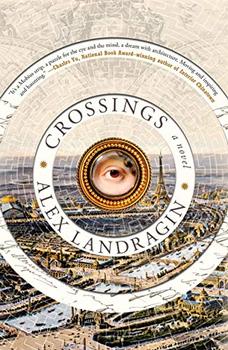Summary | Excerpt | Reading Guide | Reviews | Beyond the Book | Readalikes | Genres & Themes | Author Bio

Critics' Opinion:
Readers' Opinion:
First Published:
Jul 2020, 384 pages
Paperback:
Oct 2021, 384 pages
 Book Reviewed by:
Book Reviewed by:
Ian Muehlenhaus
Buy This Book
The maid, Odette, opened the door and ushered us in to the light and warmth. A consoling odor of roasted meats pervaded the house. There were eight of us in attendance that evening. Other than Auguste and myself, Madame Hugo, her son and his wife, there was a trio of young ladies whose names I instantly forgot. I kissed my hostess's hand with an exaggerated bow. Wine was served in the drawing room—bad wine, of course, in tiny glasses. When we took our seats, I lowered my head and devoted my attention to the soup—an excellent consommé. All around me I heard a literary conversation begin, which I studiously avoided joining. I was concerned solely with the spooning of the soup into my mouth. I did not touch the bread, knowing it would be moist, soft, and burned, as is all bread in this country.
As much as I tried to keep my mind on this simple task, however, it strayed near and far according to its own desires. I heard one of the three ladies ask me my opinion of Belgium. Auguste interrupted and attempted to steer the conversation in another direction, but another of the three demoiselles repeated the question not a minute later, by chance at the very moment there was no more consommé left in my bowl.
This time I could not resist the temptation. I paused to gather my thoughts as the maid removed my soup plate and replaced it immediately (as is the custom here) with a plate of the ubiquitous parboiled beef. Auguste's face was crumpled in a supplicating expression. I ignored it. "Where do I begin?" I began, wiping my mouth with my napkin and studying the faces of the three ladies before me. "For one thing, in this country, people's faces are ill formed and pale. Their jaws are strangely built and display a menacing imbecility. At every level, people are lazy and slow. Happiness here is an accident of imitation. Almost everyone wears a pince-nez or is a hunchback. The physiognomy of the inhabitants is shapeless and flabby. The typical Belgian is part monkey and part mollusc. He is thoughtless and heavy, easy to oppress but impossible to crush. He hates to laugh but will do so to make you think he's understood you. Beauty is despised, as is the life of the mind. Non-conformism is a heinous crime. Dancing consists of jumping up and down in silence. No one speaks Latin or Greek, poetry and literature are loathed, and people study only to become engineers and bankers. The landscapes are like the women: fat, buxom, humid, and somber. Life is insipid. Cigars, vegetables, flowers, fruits, cooking, eyes, hair—everything is bland, sad, tasteless, and drowsy. The dogs are the only creatures who are truly alive."
Other than some uneasy laughter emanating from one end of the table, my provocations elicited only silence.
"As for Brussels," I continued, "there is nothing sadder than a city without a river. Every city, every country, has its own odor. Paris smells of sour cabbage, Cape Town of sheep. There are tropical islands that smell of sandalwood, musk, or coconut oil. Russia smells of leather, Lyon of charcoal. The Orient, in general, smells of musk and carrion. By contrast, Brussels smells of black soap. The hotel rooms, the beds, the towels, the footpaths—everything smells of black soap. The buildings have balconies but one never sees anyone on them. The only sign of life is shopkeepers cleaning their shopfronts, which seems to be a national obsession, even when it is pouring with rain."
"Charles, please," I heard Auguste mumble.
"The difference between Paris and Brussels is that in Paris one is permitted to visit a brothel but not to read about it. In Brussels, it is precisely the contrary. It's a small town, teeming with jealousy and slander. As a result of indolence and impotence, the people take inordinate interest in the affairs of others—and pleasure in their misfortunes. The streets, though lifeless, are somehow noisier than Parisian streets, on account of the irregular paving, the poorly constructed buildings, the narrowness of the public thoroughfares, the savage and immoderate local accent, the prevailing rudeness, the constant whistling and the barking of dogs. The shops have no window displays. Dawdling, so dear to people endowed with imagination, is impossible—there's nothing to see, and the paths are unnavigable. Everything but the rent is expensive. Wine is a curiosity, drunk not for the taste but out of vanity and conformity, to ape the French. As for the food, everything is parboiled, never roasted, and smothered in rancid butter. The vegetables are execrable. The Belgian cook's idea of seasoning is limited to salt."
Excerpted from Crossings by Alex Landragin. Copyright © 2020 by Alex Landragin. Excerpted by permission of St. Martin's Press. All rights reserved. No part of this excerpt may be reproduced or reprinted without permission in writing from the publisher.




Discovery consists of seeing what everybody has seen and thinking what nobody has thought.
Click Here to find out who said this, as well as discovering other famous literary quotes!
Your guide toexceptional books
BookBrowse seeks out and recommends the best in contemporary fiction and nonfiction—books that not only engage and entertain but also deepen our understanding of ourselves and the world around us.